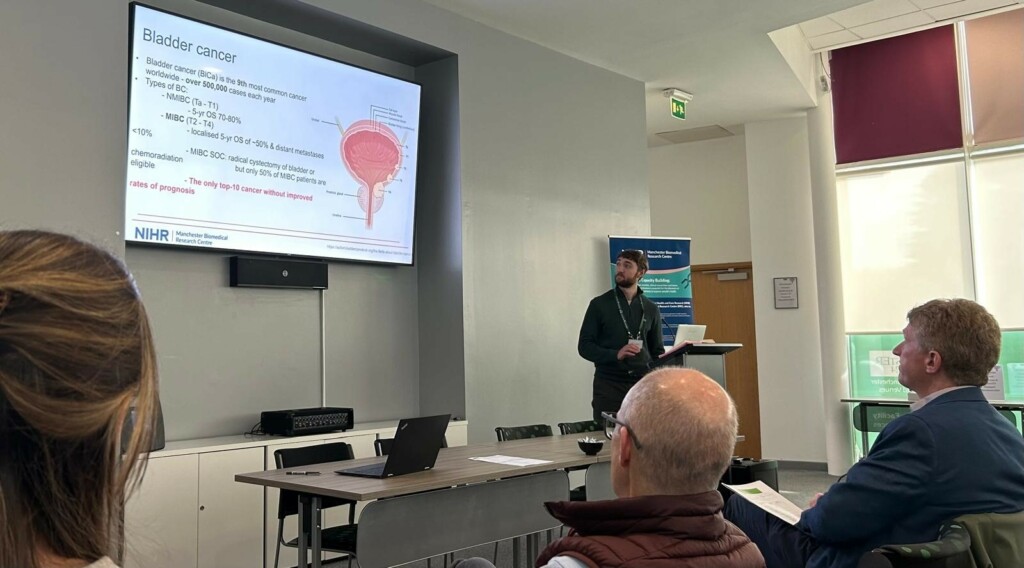PhDs in Focus: How can we improve outcomes for patients with bladder cancer?
Welcome to our PhDs in Focus blog series, where our PhD students are showcasing their pioneering research projects at the National Institute for Health and Care Research (NIHR) Manchester Biomedical Research Centre (BRC).
In this blog, Manchester BRC PhD student Fraser Child outlines how their PhD project focuses on improving outcomes for patients with bladder cancer, as part of the Advanced Radiotherapy theme.
Bladder cancer is the 9th most common cancer worldwide and is the only top 10 cancer where rates of prognosis are not improving.
Bladder cancer can be categorised depending on whether it has spread to other muscles/tissues – known as muscle-invasive bladder cancer (MIBC). When bladder cancer has spread, it becomes more difficult to treat, and these patients have significantly worse outcomes than those with non-muscle-invasive bladder cancer.
The current treatments mean patients with MIBC have one of two outcomes:
- Partial or full removal of the bladder, which could reduce quality of life due to complications from urinary diversion and potential infertility.
- A course of radiotherapy in combination with chemotherapy to destroy cancer cells, which can have unpleasant side effects such as tiredness, weakness, loss of appetite, diarrhoea or constipation.

Neither case is curative, and patients require periodic follow-up. Over the past 40 years, there has been little advancement in treatment or improvement in patient survival with MIBC.
Immunotherapy
The National Institute for Health and Care Research (NIHR) Manchester Biomedical Research Centre (BRC) Advanced Radiotherapy theme is exploring immunotherapy as a better targeted treatment for bladder cancer.
Immunotherapy works by helping the immune system to find and attack cancer cells. It can induce longer-lasting responses compared to chemotherapy, but the number of patients that this works for (response rate) is very low (1 in 5 people). Our goal is to understand why around 80% of bladder cancer patients fail to respond to immunotherapy.
Cancer and tumours are very complex. A sole cause rarely has a sole effect on the patient’s disease – in fact, many factors are likely contributing to why the patient’s cancer fails to respond to certain treatments. In the case of immunotherapy, tumours hijack the patient’s immune system to ultimately evade and escape cancer-killing mechanisms.

Fraser presenting at the Manchester BRC PhD Showcase
Our research
Two crucial immune cells, macrophages and neutrophils, protect the body from infection and disease. Tumours can convert these cells to help the cancer grow and evade treatment. Our key aim is understanding how tumours do this in bladder cancer patients.
To help answer this, our group at The University of Manchester is isolating neutrophils and macrophages from healthy volunteers and comparing these to macrophages and neutrophils in bladder cancer patients.
Initially, we are mimicking what is seen in bladder tumours in the lab to understand the mechanisms that drive anti-tumour macrophages and neutrophils to become tumour-promoting.
Preliminary data indicates that the oxygen levels in the tumour microenvironment can affect whether neutrophils are anti or pro-tumour. As we continue this research, we aim to identify a population of neutrophils and/or macrophages that are central to bladder cancer progression and resistance to immunotherapy.
In doing so, we will potentially identify biomarkers such as myeloid-proteins in bladder cancer patients with hypoxic (low oxygen) tumours. Patients could then be grouped based on whether they will benefit from immunotherapy. We could also identify new therapeutic targets and uncover new ways to target cancers and overcome treatment resistance.
Read more blogs in the PhDs in Focus series to find out how we’re developing a research talent pipeline.
Follow Manchester BRC on X/Twitter and LinkedIn to keep updated with the series.
